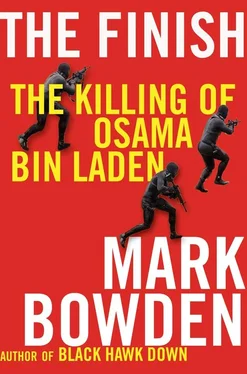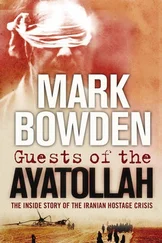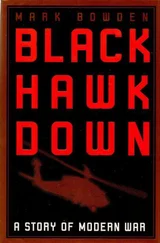“Islam is a system given by God and it aims to establish a fundamental principle of God’s sovereignty and people’s servitude to Him alone,” Qutb wrote. “As such, Islam has the right to remove all obstacles from its way and address people freely without any impediments such as a political system or social customs and traditions… it is the right of Islam to take the initiative. It is not the creed of a particular people or the system of a particular country. It is a system given by God for the entire world. As such, it has the right to take action to remove all obstacles that fetter man’s freedom of choice. It is a faith that does not force itself on any individual, it only attacks situations and regimes in order to free individuals from deviant influences that corrupt human nature and restrict man’s freedom.”
Young Osama bin Laden was not the first youth to be swept up by a pure, simple ideology that promised to create freedom of choice by abolishing everything that disagreed with it. The Koran stood like a rock in the shifting waters of human history. Progress for human beings meant one thing: living more closely to the teachings of the book.
“The Islamic concept of Divinity is utterly distinct from man’s… and therefore it does not need to develop or change,” Qutb wrote. “The One who established this concept can envision without limits of time or space. His knowledge is immune to the obstacles of ignorance and deficiency; and He chooses without being influenced by passion or emotion. Therefore, He has established for the entirety of humanity, in all places and at all times, a firm principle within the framework of which human life freely advances and develops.”
Accused of participating in a Muslim Brotherhood plot to assassinate Egyptian strongman Gamal Abdel Nasser, Qutb went to the gallows with his beliefs unshaken. “The Muslim Brotherhood is not a party of preachers and missionaries but rather of divine enforcers,” he wrote. “Its mission is to blot out, by force if necessary, oppression, moral anarchy, social disorder, and exploitation so as to finish the so-called divine role of self-styled gods and replace evil with good. ‘Fight them,’ the Koran says, ‘until there is no more oppression, and all submission is made to God alone.’”
Bin Laden became a “divine enforcer.” As a young man, he was not a scholar or much of a thinker, and he lacked Qutb’s eloquence. Those who knew him found him tongue-tied and unimpressive. But he was ambitious, and rich. His billionaire father was killed in a plane crash in 1967, leaving behind enough of a fortune to make all of his offspring at least multimillionaires. Bin Laden’s inheritance at age ten was estimated in the tens of millions. He had no interest in using his wealth to build a fine home or adopt a luxurious lifestyle, though, as many of his siblings did. His inclinations ran the opposite way. He had been educated in a private secular school, but by the time he attended King Abdulazzi University, where he studied economics and business management, he was already preaching simplicity and seemed primarily interested in religion and charitable work. He continued to pursue these interests until the Soviet Union invaded Afghanistan and launched him on the path toward his life’s work.
Huthaifa Azzam was just fourteen years old when he answered a bell on the gate outside his father’s house in Jordan. He found a very tall, very thin, swarthy and bearded young man wearing Arab robes and a simple white turban, not the typical red-and-white-checked headdress, or shemagh, worn by most Saudi men. The visitor asked, shyly, “Is this the house of Dr. Abdullah Azzam?”
Azzam was a prominent Palestinian Islamist and scholar whose fatwa, “Defense of the Muslim Lands: The First Obligation After Faith,” had caused a stir in the Arab world, summoning the faithful to Afghanistan to resist the infidel Soviets. Azzam had done more than preach. He had relocated to Pakistan to take part in the holy war himself. Based in Peshawar, close to the Afghan border, he had established what he called the “Services Office,” to recruit and train young Arab volunteers to join the fight. Magazines, photos, and videos prepared by the office spread news of the heroic religious resistance throughout the Arab world… and had found their way to young bin Laden. Azzam was taking a short holiday break with his family in Jordan when the young Saudi made the four-hour trip to ring his bell. This volunteer was different from most, of course, because of his fortune. Azzam must have been delighted. The two men spoke for hours that day, and by evening bin Laden was a recruit. He pledged himself to the cause. He was still enough of a loyal Saudi subject, however, that he delayed traveling back with Azzam in order to seek permission from King Fahd. He arrived in Peshawar several weeks later.
At that point, bin Laden’s money was more valuable to the cause than his leadership or even his life, and so during those first years with Azzam he stayed safely behind the lines, working at the Services Office and helping to attract other young fighters to the cause. This was not destined to last. Bin Laden was a romantic, and a zealot, and he had not made his jihad to live safely behind the lines. He grew apart from Azzam, increasingly falling in with Ayman al-Zawahiri, the radical Egyptian physician who had left his home country after serving three years in prison. Zawahiri worked at a Red Crescent hospital in Peshawar. Although only six years older than bin Laden, he was a man of wider experience and education, and had been deeply embittered by the torture he had undergone at the hands of Egyptian police. His angry radicalism stirred bin Laden to play a more active role in the holy war—to become a full-fledged mujahid himself.
Bin Laden’s growing extremism began to trouble his Palestinian mentor. Azzam, a college professor, balked at bin Laden’s refusal to send his children to school. The younger man wanted Arab recruits to form separate, religiously pure fighting units, while Azzam believed the Arabs would be better employed if mixed with the savvier, more experienced Afghan militia. He also resisted his protégé’s growing carelessness about human life. Bin Laden had embraced a broad definition of “infidel.” Until that point, the enemy had been understood to be Russian soldiers and Afghans who fought with them. They were at war, after all. Bin Laden had expanded the definition. It now applied to any Russian, even any non-Muslim. He was fighting a bigger war than the one being promoted by Azzam. The older man’s wife, Samira, remembers her husband arguing with bin Laden about the younger man’s plan to place a bomb on a bus full of Russians visiting Pakistan.
“You entered Pakistan on a visa,” Azzam reminded him. “The visa is a contract. You signed when you obtained the visa that you would not be a troublemaker nor break the laws. A Muslim should not break a contract.”
“Pakistan is a Muslim country,” bin Laden told him, by which he meant that non-Muslims had no business coming there.
It was one thing, Azzam argued, to kill Russians who invaded Afghanistan and held it by force, quite another to target innocent civilians on a holiday to a country that welcomed them.
“So what will happen if Russia loses a bus full of people?” bin Laden said dismissively. “It is not going to matter.”
He had moved beyond the conflict in Afghanistan. His faith empowered him. God had touched him. This gave him the right to decide, to kill.
Bin Laden also felt that jihad demanded that he actually fight as well, not just take part in recruiting, training, and paying others to do so. The older man argued with him for months, no doubt convinced that a multimillionaire Saudi was worth more to the cause alive than dead. But bin Laden had made up his mind. He was going to cross the border and join the battle. In 1987, he split with Azzam. He recruited his own band of about two dozen Arab fighters, creating the kind of fighting unit he preferred—a pure, all-Arab force of men who fought for religious reasons alone, not just for the principle of Afghan nationalism. Equipped with weapons and bulldozers, they drove ten miles or so into Afghanistan, joined up with some like-minded Afghan fighters, and set about building a mountain outpost near the village of Jaji. Bin Laden fortified a series of ridges and began building roads and other structures—he said a school and a hospital—that advertised their presence. It was in easternmost Afghanistan, in rugged country, and was not a strategically important spot, at least not in any conventional sense. Bin Laden called it al-Masada, the Lion’s Den. It was near a much larger Soviet garrison and its primary purpose was to provoke an attack. To a practical man like Azzam (who would be assassinated two years later) this probably appeared foolhardy, but bin Laden lived in a world of romantic fantasy, and in that realm, al-Masada made perfect sense. The battle was not just for Afghanistan, but for the whole world. It was the beginning of a new caliphate, the dawn of a new Muslim age. He was a holy warrior, and warriors did not win battles by writing checks and making videos and leading from the rear. In his view, the idea wasn’t to defeat the Soviets in battle, or even to survive, but to display such heroism and resolve that it would inflame the fighting spirit of the greater Muslim Nation.
Читать дальше












